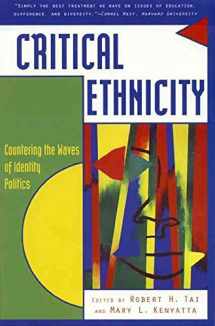
Critical Ethnicity
ISBN-13:
9780847691135
ISBN-10:
0847691136
Author:
Robert H. Tai, Mary L. Kenyatta
Publication date:
1999
Publisher:
Rowman & Littlefield Publishers
Format:
Hardcover
224 pages
FREE US shipping
Book details
ISBN-13:
9780847691135
ISBN-10:
0847691136
Author:
Robert H. Tai, Mary L. Kenyatta
Publication date:
1999
Publisher:
Rowman & Littlefield Publishers
Format:
Hardcover
224 pages
Summary
Critical Ethnicity (ISBN-13: 9780847691135 and ISBN-10: 0847691136), written by authors
Robert H. Tai, Mary L. Kenyatta, was published by Rowman & Littlefield Publishers in 1999.
With an overall rating of 3.7 stars, it's a notable title among other
books. You can easily purchase or rent Critical Ethnicity (Hardcover) from BooksRun,
along with many other new and used
books
and textbooks.
And, if you're looking to sell your copy, our current buyback offer is $0.48.
Description
As we enter the 21st century, the terms ethnicity and race are more often being used interchangeably. However, ethnicity and race have historically meant different things in the United States. What does it mean to refer to racial minorities as ethnic minorities? What are the social dynamics that have led to a broadening of the discourse on diversity and multiculturalism to include more types of culturally-based differences, while the practice of labeling those who are not white as "other" continues apace? In Critical Ethnicity, leading scholars from several disciplines explore the interactions of ethnicity, race, and education in the United States, which are embedded within discussions of diversity, multiculturalism, and identity politics. Contributors to this volume, including Stanley Aronowitz, Lilia I. Bartolome, Donaldo Macedo, Michelle Fine, Lois Weis, Linda C. Powell, Margaret Andersen, Antonia Darder, and Kofi Lomotey, reveal how terms such as "at risk" and "culture of poverty" hide the insidious racism that underlies much of our social relations. This volume attempts to help educators interpret their locations in society, to expose power relationships, and to understand how all of us--irrespective of color, gender, age, ethnicity, and sexual orientation--are affected by hegemony and oppression.


We would LOVE it if you could help us and other readers by reviewing the book
Book review

Congratulations! We have received your book review.
{user}
{createdAt}
by {truncated_author}


